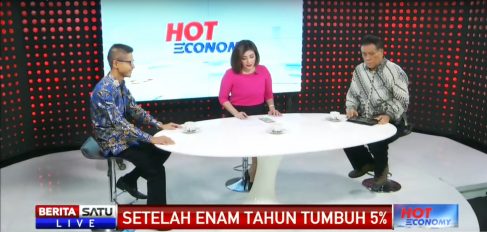Ari Kuncoro: These are Strategic Policies to Push Economic Growth Above 5.3%
Nino Eka Putra – Humas FEB UI
JAKARTA – For six years Indonesia’s economy has grown by 5 percent. This figure is better than the big countries in the world outside of China. In the midst of global economic uncertainty, this is a question of whether the Indonesian government’s economic policies have provided hope for growth of 5.3 percent.
Viewed from the structure of the Indonesian economy today it still depends on imports, especially industry. If the economy is pushed too fast when exports slow down, the risk of the trade / payment balance will collapse.

“In terms of our economic growth at 5% and inflation at 3% associated with the middle income trap which is a calculation that does not pay attention to purchasing power. Actually, the impact of 5% growth is not in line with job opportunities. To achieve growth above 5.3 percent, investment must grow 8 percent,” said Ari Kuncoro as UI Chancellor who was a guest speaker on the Hot Economy News TV One ‘After Six Years of Growth of 5%’, on Thursday (6/2/2020 ).
Ari continued, GDP growth in various countries was uneven. For example, in Indonesia from various regions, such as Sulawesi has the ability to process the agricultural sector into agribusiness. Meanwhile, Java has a lot of manufacturing that grows quite slowly and has a dense population but is connected to infrastructure, both toll roads and railways. In addition, in the east, Papua must have a city large enough so that the economy can be consolidated.
One of the characteristics of Indonesian society is that after there has been an announcement of positive sentiment, we are waiting for the implementation of derivative regulations. “So, this omnibus law needs to be followed by derivative regulations from implementation instructions to technical. In addition, public expectations also relate to consumption (clothing, household appliances, and durable materials),” he added.
Ari added, related to omnibus law is an attempt to harmonize. For this reason, Indonesia must learn from the strategies carried out by Vietnam and Bangladesh in addition to concentrating the omnibus law but also escorting companies and creating port-based industrial estates, because the closer they become the networking occurs.
Meanwhile, the consumption of durable goods has begun to decline and there is a shift in consumption in terms of services namely health, education, traveling, hotels, and restaurants.
“The strategic policy that must be taken by the government is by making positive expectations and credibility and the trade war into negative expectations in economic growth. This is an attempt to strike a balance between purchasing power and production flows simultaneously connected between various regions in Indonesia. So, the government must look for new sources of economic growth from various sectors to develop creativity and flexibility,” he concluded. (Des)







